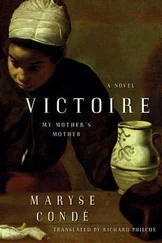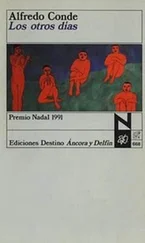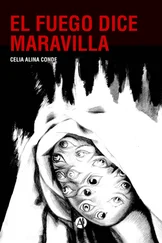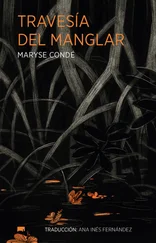As long as there was daylight, Hakim stood in front of this window. He never tired of gazing at this wall, for him a symbol of his life. At age twenty-four his hopes had been dashed. A penal colony. What could it look like? Like a fortress. Surrounded by stone walls. Rather than think about it, however, he filled his head with all sorts of imaginings. Better not look into the past. Bamako. Bokar. Bingerville. Celanire. The Home. Kwame Aniedo. All that was over with. Gone were the rage and revolt that had racked him while he awaited his sentence. He had grown indifferent, like a lamb passively awaiting the slaughter at the feast of Tabaski. Mr. Rozier, who visited him regularly once a week, promised him a presidential pardon. He also told him that Guiana was a French territory in South America, situated between the Amazon and the Orinoco. This set Hakim dreaming. He imagined a dense, sempiternally green forest. Slow-moving, muddy rivers whose banks are eaten away by mangrove swamps. Dugout canoes loaded with naked, oily-haired Amerindians plying upstream. The men standing at the prow, armed with arrows whose heads are daubed with curare, a deadly poison. The women breast-feeding their babies, clinging to their sides like tadpoles. On their faces an expression of placid bliss. Setting foot on shore, they merged into the forest, heading for their huts in single file under the protection of the trees. At night, swaying in their hammocks, the men made love, preferably among themselves, sometimes with the women. Why had humanity shunned these mornings of the world? Why had predator nations wanted to discover other lands? And conquer and colonize them — in other words, destroy them?
As soon as night fell, Hakim’s thoughts took on a darker shade. In the icy darkness, however tightly he curled himself up, however much he called out to it in tears, sleep wanted nothing to do with him. He shivered with cold. His desperately sad life stretched out forever in front of him. A half-caste mockingly nicknamed Toubabou, “white boy,” growing up an outcast among other outcasts. Where was Bokar buried? He had never seen his grave. Mr. Philosophizer at Adjame-Santey, ridiculed by the Africans, held in contempt by the French. Then assistant to the merchant he had stupidly thought a friend. In reality Betti Bouah had always despised him because he wasn’t an Akan, he was merely a bastard without a race. Odd as it may seem, the only person who had taken any interest in him, had desired him, perhaps loved him, was Celanire. Pity he could not return the compliment. Unfortunately, you cannot force your nature. However much a prisoner he was, rotting in his dungeon, the very thought of what she expected of him made him feel sick.
One day two white men in pith helmets and khaki uniform, their faces cooked red like those exposed to the colonies, pushed open his cell door. They looked at him as if he were a heap of vermin, muffling their noses with a handkerchief against the stink that no longer bothered him. One of them unrolled a document and in a strong Corsican accent read him a series of orders. He retained just one thing. In one week he would embark on the Neptune for Serouane, where he would join the other convicts, all Arabs assembled together from every corner of North Africa. From Serouane the voyage to the transportation camp at Saint-Laurent-du-Maroni in Guiana would take three months. When he had finished reading, the Corsican’s voice mellowed. He added that if Hakim renounced his political ideas and proved to be a model prisoner, he might be freed before the end of his sentence. In such an event he would be granted a piece of land. He could even take a wife and settle in Guiana. Other convicts before him had married and had sons.
Meanwhile at Bingerville events were working up to a crescendo.
Blacks and whites alike were still reeling from the shock of Kwame Aniedo’s murder and Hakim’s banishment. Most people were convinced the latter was innocent. The truth lay elsewhere. But where? That is the question! They would have liked to accuse Celanire. But for once she seemed as innocent as the Lamb of God. She had no known liaison either with Hakim or Kwame Aniedo and had no personal interest in their killing themselves. Some of the French, however, suspected Hakim of being a homosexual, since he had never been seen with a woman. But even the most malicious hid their thoughts like dirty washing at the bottom of a closet.
To everyone’s surprise, whereas Koffi Ndizi was thought to be an unnatural father, the death of his first son dealt him a fatal blow. One week after Kwame Aniedo had been laid to rest, a cold nailed the old man to his bed and snuffed him out like a candle before Queen Tadjo in her eagerness had time to prepare a concoction of zinblannan herb tea. His family preferred to forget he had converted to Christianity and gave him the funeral of an Akan king. Twenty slaves were sacrificed to serve him in the afterlife. Dozens of professional mourners filled the air with their wailing. During a week of feasting and drinking, gallons and gallons of palm wine flowed. Besides the slaves, the fetish priests slaughtered over a hundred oxen and as many sheep on the sacrificial stones, not forgetting the countless chickens plucked until every finger was worn out. The tradition of interrogating Koffi Ndizi’s corpse resulted in some strange happenings. Normally, when the question is asked who killed the dead man and a series of names are put forward, the porters carrying the corpse take three steps forward for a yes and three steps back for a no. But this time the interrogation caused such a free-for-all that two young people were crushed to death and half a dozen others were hurt. A few days after the funeral the wives and concubines whom Koffi Ndizi had repudiated returned to reoccupy their former quarters. Alas, not for long. The king had made a donation.
The affair had been conducted expertly by the illiterate king, oddly well informed of the mysteries of French law. One day he had gone to Grand-Bassam with two witnesses and in the presence of a notary had donated all his movable and immovable goods to the director of the Home, Mademoiselle Celanire Pinceau. Informed by Betti Bouah, the council of elders in its rage endeavored to prevent this act of madness. Alas, the deeds of donation were already stamped and signed. This was the beginning of a legal imbroglio that went through a dozen attorneys and reached an outcome only in 1963, three years after the independence of the Ivory Coast. The case came to be known as The Heirs of Felix Koffi Ndizi, King of Abila, versus Celanire Pinceau . In the meantime, Bingerville experienced the sorry sight of the queen mother, Queen Tadjo, and the ex-royal wives and concubines being thrown out manu militari by a rabble of tarbooshed soldiers. One melancholy morning a gang of Ebriés razed the compound to the ground as part of their corvée . In its place a magnificent sports stadium was built for the students at the Home. The inhabitants of Bingerville had hardly got over this affront to their late king when Tanella returned, free as a bird, after having waited for two years in Dakar for a court decision. She climbed out of a fishing canoe on the lagoon and, followed by a porter, his legs bowed from the weight of her heavy green trunk, walked through Bingerville in the direction of the Home. Those who saw her pass by were flabbergasted. When she had fled Koffi Ndizi’s compound after her deadly deed, she had been no more than a shy young girl with chubby cheeks. Now she had been transformed into a woman! At the prison in Dakar she had passed the native certificate of elementary studies. She had also learned to dress in the European fashion, and on that particular day she was flaunting a blue-patterned orange dress and a straw hat with a matching blue ribbon. But people had little time for their usual idle chatter as to who was the loveliest, Tanella or Celanire. It wasn’t long before they had far more serious matters to discuss. First of all one of the nurses recounted how Tanella and the oblate had become as intimate as husband and wife. Instead of entertaining the white guests of an evening at the dances organized at the Home, they made whoopee among themselves. They rubbed up against each other, dancing the habanera or the beguine, a dance from Guadeloupe. They drank champagne from the same glass until they were completely intoxicated. Once the visitors had left, they locked themselves in the same room. If Tanella was shy, Celanire was excessively bold. Even in public it was a never-ending serenade of “my pet” and “my little darling” and unequivocal caresses. Furthermore, Tanella had become Celanire’s right-hand woman. She supervised the workers in the palm groves, and the cooks in the refectory, and checked the accounts to such an extent that Madame Desrussie, whose place she had usurped, never stopped lamenting and took to absinthe. In the evening you could see her totter across the garden.
Читать дальше












